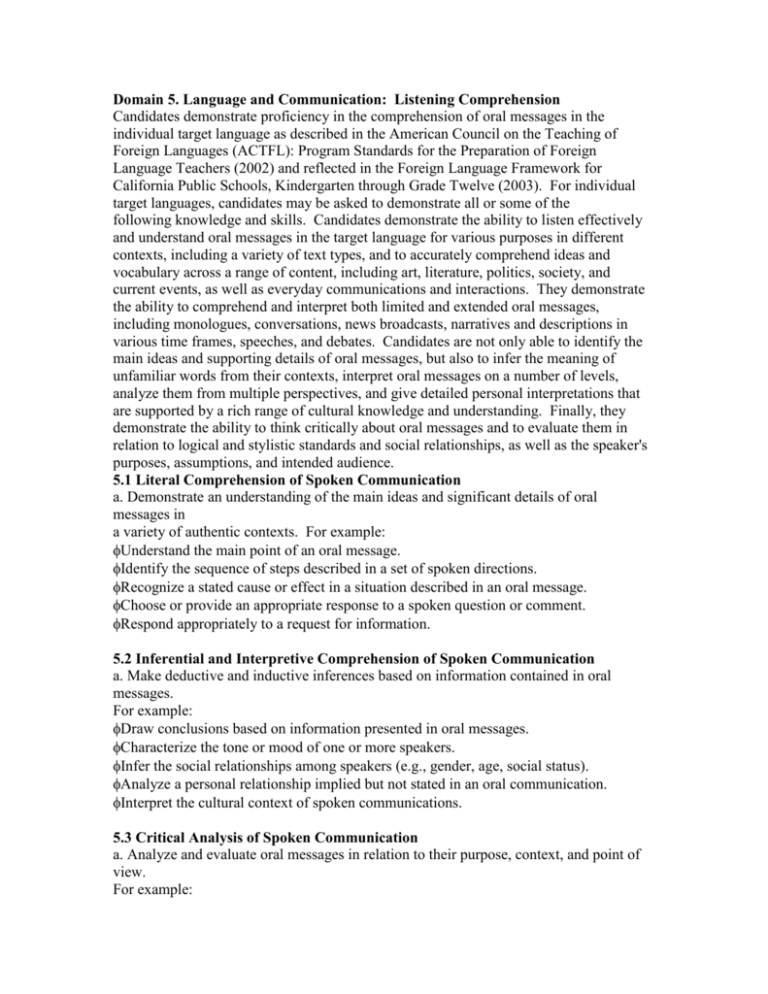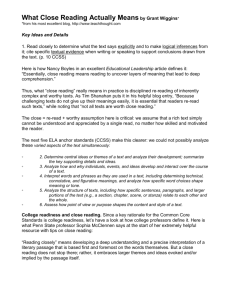Domain 5. Language and Communication: Listening
advertisement

Domain 5. Language and Communication: Listening Comprehension Candidates demonstrate proficiency in the comprehension of oral messages in the individual target language as described in the American Council on the Teaching of Foreign Languages (ACTFL): Program Standards for the Preparation of Foreign Language Teachers (2002) and reflected in the Foreign Language Framework for California Public Schools, Kindergarten through Grade Twelve (2003). For individual target languages, candidates may be asked to demonstrate all or some of the following knowledge and skills. Candidates demonstrate the ability to listen effectively and understand oral messages in the target language for various purposes in different contexts, including a variety of text types, and to accurately comprehend ideas and vocabulary across a range of content, including art, literature, politics, society, and current events, as well as everyday communications and interactions. They demonstrate the ability to comprehend and interpret both limited and extended oral messages, including monologues, conversations, news broadcasts, narratives and descriptions in various time frames, speeches, and debates. Candidates are not only able to identify the main ideas and supporting details of oral messages, but also to infer the meaning of unfamiliar words from their contexts, interpret oral messages on a number of levels, analyze them from multiple perspectives, and give detailed personal interpretations that are supported by a rich range of cultural knowledge and understanding. Finally, they demonstrate the ability to think critically about oral messages and to evaluate them in relation to logical and stylistic standards and social relationships, as well as the speaker's purposes, assumptions, and intended audience. 5.1 Literal Comprehension of Spoken Communication a. Demonstrate an understanding of the main ideas and significant details of oral messages in a variety of authentic contexts. For example: Understand the main point of an oral message. Identify the sequence of steps described in a set of spoken directions. Recognize a stated cause or effect in a situation described in an oral message. Choose or provide an appropriate response to a spoken question or comment. Respond appropriately to a request for information. 5.2 Inferential and Interpretive Comprehension of Spoken Communication a. Make deductive and inductive inferences based on information contained in oral messages. For example: Draw conclusions based on information presented in oral messages. Characterize the tone or mood of one or more speakers. Infer the social relationships among speakers (e.g., gender, age, social status). Analyze a personal relationship implied but not stated in an oral communication. Interpret the cultural context of spoken communications. 5.3 Critical Analysis of Spoken Communication a. Analyze and evaluate oral messages in relation to their purpose, context, and point of view. For example: Analyze a speaker's assumptions or point of view. Analyze the historical, social, or cultural context of an oral message. Evaluate the sufficiency and reliability of evidence presented in support of statements made in oral messages. Evaluate the social and cultural appropriateness of the language used in oral messages. Analyze the communicative and discourse strategies employed in oral messages. (American Council on the Teaching of Foreign Languages (ACTFL): Program Standards for the Preparation of Foreign Language Teachers, 1.a.) Domain 6. Language and Communication: Reading Comprehension Candidates demonstrate proficiency in the comprehension of written texts in the individual target language as described in the American Council on the Teaching of Foreign Languages (ACTFL): Program Standards for the Preparation of Foreign Language Teachers (2002) and reflected in the Foreign Language Framework for California Public Schools, Kindergarten through Grade Twelve (2003). For individual target languages, candidates may be asked to demonstrate all or some of the following knowledge and skills. Candidates demonstrate the ability to read effectively and understand written texts in the target language for multiple purposes in different contexts, including a variety of text types, and to accurately comprehend ideas and vocabulary across a range of content, including art, literature, politics, society, and current events, as well as everyday communications and interactions. They demonstrate the ability to comprehend and interpret a variety of texts written in the target language, including expository prose, personal essays, newspaper and magazine articles, narratives and descriptions, correspondence, Web sites, electronic messages, and realia (e.g., signs, flyers, menus). Candidates interpret written texts on a number of levels, analyzing them from multiple perspectives, synthesizing concepts and ideas, and giving detailed personal interpretations that are supported by a rich range of cultural knowledge and understanding. Finally, they demonstrate the ability to think critically about what they read and to evaluate written texts in relation to logical and stylistic standards and social relationships, as well as the author's purposes, assumptions, and intended audience. 6.1 Literal Comprehension of Written Texts a. Demonstrate an understanding of the main ideas and significant details of written texts. For example: Demonstrate an understanding of the main idea or compose an accurate summary of a written text. Recognize supporting evidence for an argument made in a passage. Analyze a passage to determine a causal or temporal sequence of events. 6.2 Inferential and Interpretive Comprehension of Written Texts a. Make deductive and inductive inferences based on information contained in written texts. For example: Make inferences about purpose and audience from information provided in a passage. Identify a writer's intent, assumptions, or point of view. Recognize implied cause-and-effect relationships in a passage. Interpret figurative language (e.g., metaphors, similes) in a passage. Draw conclusions from information presented in a passage. Analyze a passage to determine assumptions that are implied, but not explicitly stated, in the passage. 6.3 Critical Analysis of Written Texts a. Apply critical reasoning skills to written texts. For example: Analyze the historical, social, and cultural contexts of written texts. Analyze relationships among ideas in written texts. Distinguish between fact and opinion in written texts. Assess the sufficiency and reliability of evidence presented in support of statements made in written texts. Recognize fallacies in the logic of a writer's argument. Assess the credibility, objectivity, or bias of material contained in written texts. (American Council on the Teaching of Foreign Languages (ACTFL): Program Standards for the Preparation of Foreign Language Teachers, 1.a.) Domain 7. Language and Communication: Oral Expression Candidates demonstrate proficiency in oral expression in the individual target language as described in the American Council on the Teaching of Foreign Languages (ACTFL): Program Standards for the Preparation of Foreign Language Teachers (2002) and reflected in the Foreign Language Framework for California Public Schools, Kindergarten through Grade Twelve (2003). For individual target languages, candidates may be asked to demonstrate all or some of the following knowledge and skills. Candidates demonstrate the ability to speak effectively in everyday situations and to react competently when asked to respond orally to a complication or an unexpected turn of events. They speak with good pronunciation and intonation and with sufficient accuracy to participate effectively in most formal and informal conversations on practical, social, professional, and abstract topics and are able to narrate and describe in major time frames, providing detailed accounts and exhibiting good control of aspect. Candidates demonstrate the ability to speak effectively in the target language for various purposes in different contexts, employing a variety of text types and accurately expressing ideas in culturally appropriate language across a range of content, including art, literature, politics, society, and current events, as well as everyday communications and interactions. Finally, they are able to deliver oral presentations on a wide range of topics, employing strategies and vocabulary tailored to the speaking situation, and present narrations and descriptions that relate relevant and supporting facts in extended and cohesive discourse. 7.1 Speaking in the Target Language for a Variety of Purposes in Authentic Contexts a. Construct connected oral discourse that communicates a message effectively, demonstrating a wide range of vocabulary, idiomatic expressions, and linguistic structures. For example: Speak appropriately within the context of everyday situations (e.g., school, work, shopping). Respond to a variety of unexpected situations (e.g., misplaced luggage at an airport) by explaining or describing events or by requesting assistance. Formulate and defend a hypothesis in response to a given situation. Narrate or describe a personal experience. Deliver oral presentations on a wide variety of topics to diverse audiences. Talk formally and informally about topics of current public and personal interest, demonstrating an ability to use different registers and styles of speech in appropriate contexts. Discuss the advantages and disadvantages of an idea or a proposed course of action. Take a position on an issue and support it with persuasive evidence. Demonstrate the ability to speak effectively on abstract topics and themes. (American Council on the Teaching of Foreign Languages (ACTFL): Program Standards for the Preparation of Foreign Language Teachers, 1.a.) Domain 8. Language and Communication: Written Expression Candidates demonstrate proficiency in written communication in the individual target language as described in the American Council on the Teaching of Foreign Languages (ACTFL): Program Standards for the Preparation of Foreign Language Teachers (2002) and reflected in the Foreign Language Framework for California Public Schools, Kindergarten through Grade Twelve (2003). For individual target languages, candidates may be asked to demonstrate all or some of the following knowledge and skills. Candidates write in major time frames, employ vocabulary appropriate to purpose and audience, and use a variety of different syntactic structures. When writing texts of several paragraphs in length, they demonstrate competence in the use of a variety of cohesive devices and discourse strategies. Candidates demonstrate the ability to write effectively in the target language for various purposes in different contexts, employing a variety of text types, and to accurately express ideas in culturally appropriate language and vocabulary across a range of content, including art, literature, politics, society, and current events, as well as everyday communications and interactions. Finally, they demonstrate the ability to express themselves through formal and informal writings on practical, social, and professional topics and to write about issues and events of public and personal relevance through extended written texts. 8.1 Writing in the Target Language for a Variety of Purposes in Authentic Contexts a. Compose a well-organized passage in the target language, employing styles and levels of diction appropriate for a given audience, purpose, and occasion and demonstrating command of a wide range of vocabulary, idiomatic expressions, and linguistic structures. For example: Demonstrate the ability to compose written texts in appropriate orthography and writing systems. Compose personal correspondence. Compose formal correspondence for a variety of purposes and audiences. Write cohesive summaries of a variety of extended written texts (e.g., a newspaper article, an excerpt from a textbook). Write extended narratives and detailed descriptive accounts of events. Formulate and defend a hypothesis in response to a given situation. Describe the reasoning behind a personal or professional decision. Discuss the advantages and disadvantages of an idea or a proposed course of action. Take a position on an issue and support it with persuasive evidence. Demonstrate the ability to write effectively on abstract topics and themes. (American Council on the Teaching of Foreign Languages (ACTFL): Program Standards for the Preparation of Foreign Language Teachers, 1.a.)









